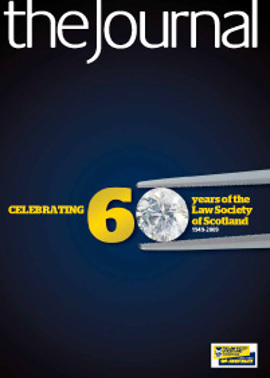Backing for "Wider Choice"

The Scottish Government should take the necessary steps to amend or repeal the legislation that currently impedes or prevents alternative business structures as soon as possible. So declared the Law Society of Scotland at the outset of its response to the Scottish Government’s paper Wider Choice; Better Protection.
The Society also wishes to take on regulatory responsibility for alternative business structures (ABS), proposing a regulatory framework to support this recommendation.
In line with the policy approved by the AGM in May 2008, the Society argues that practitioners should have sufficient freedom to offer services through structures which best meet the needs of modern society and a global economy, or to retain the traditional business model – in which latter case the arrangements for their regulation should continue as now.
Essential elements
“The fundamental question”, the submission states, “is how to provide modern business methods for the delivery of legal services in Scotland which are safe, effective and which benefit the public and the profession.
“Regulation of the legal services market is an essential component which contributes to the proper functioning of the justice system, the economy and society in general.”
Essential elements are appropriate educational qualifications, a licensing procedure, a complaints procedure, and a range of consumer protections. And the system must protect the core values of the Scottish legal profession and ensure a fair and equal playing field for all legal service providers in Scotland. “There is also a strong view that the Society and its standards of conduct rules are fundamental to any system of appropriate regulation.”
To achieve maximum flexibility and avoid a confusing regulatory maze, the Society backs a single regulatory model that can accommodate all business structures. It supports the proposal that there should be a statement of regulatory objectives that apply equally to ABS and traditional firms, and to the Society itself, supplemented by considerations to guide the actions of regulators. There should also be a statement of professional principles for those providing services in ABS, and power in a regulator to impose conditions on, or refuse, a licence to operate an ABS where there is evidence of a risk of access to justice.
Regulation, the Society agrees, should take place at entity level, while individuals are regulated by their own professional bodies. The entity regulator should have primacy; but there remains a risk of conflict over the division of responsibilities, or even on basic principles, which the Society will attempt to pre-empt through discussions with potential co-regulators before the legislation is passed.
It also calls for careful consideration of the impact of the EU Services Directive in relation to protection of legal professional privilege.
Professional responsibility
The Society recognises that it must itself adopt revised and modernised governance arrangements in order to be an effective regulator of ABS, and points to the work culminating in the principles for reform reported on p 40 of this issue.
But it rejects any move to separate its regulatory and representative functions. “The Society believes that a conjoined approach lies at the heart of the profession and that separating the functions would be harmful to the delivery of that ideal.” Not only would it be expensive and bureaucratic, but recognition of a responsibility to act in the public interest in all that it does, lies at the core of any profession.
It supports the argument that a separate regulatory committee would satisfy the request for separation of the regulatory function.
Public protection should be maintained, the Society also states, through a requirement on an ABS to operate equivalent professional indemnity insurance arrangements, plus fidelity cover similar to the Guarantee Fund – though it will in future be necessary to put a cap on liability under the Fund.
Although the Society’s own paper last year supported the principle of partnerships between solicitors and advocates, it does not press the point in its current response, suggesting that it is for others to decide whether advocates should take part, provided it is easy to transfer between the branches of the profession.
Finally, the paper supports regulation both of claims management and of will writing businesses, pointing to instances of misleading advertising which may in particular catch those most in need of consumer protection.
The Society’s President, Richard Henderson said: “The Society’s consultation response aims to assist the Scottish Government, the Scottish Parliament and its members in improving access to high quality and well regulated legal services. We would encourage the Scottish Government to amend or repeal the legislation that currently prevents alternative business structures as soon as possible.
“This is one of the most important issues to arise in the history of the Scottish legal profession and could result in far reaching changes for the profession, the Society and the public.”
In this issue
- Defining year
- At the heart of the debate
- In shape at 60
- Banks doing business
- To take us forward
- Striving after fairness
- Knowledge is protection
- The changing role of the law school
- Risk: nip it in the bud
- Close relations
- Conference keeps getting better
- Booming baby boomer
- Channel vision
- Variations on a theme
- Customer survey scores a plus
- Prepare for the upturn
- New look Society gets go-ahead
- Backing for "Wider Choice"
- Private client tax specialists recognised
- Law reform update
- From the Brussels office
- Target 2010
- Questions of our times
- Ask Ash
- Breaking the chain
- What will they do next?
- Sins of emission
- Scottish Solicitors' Discipline Tribunal
- Are we ready?
- Website review
- Book reviews
- Duty within bounds
- Change to fair
- Home reports update






